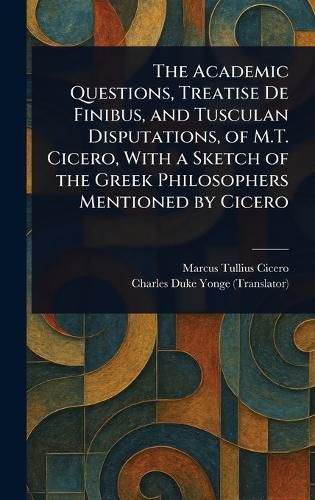Readings Newsletter
Become a Readings Member to make your shopping experience even easier.
Sign in or sign up for free!
You’re not far away from qualifying for FREE standard shipping within Australia
You’ve qualified for FREE standard shipping within Australia
The cart is loading…






This title is printed to order. This book may have been self-published. If so, we cannot guarantee the quality of the content. In the main most books will have gone through the editing process however some may not. We therefore suggest that you be aware of this before ordering this book. If in doubt check either the author or publisher’s details as we are unable to accept any returns unless they are faulty. Please contact us if you have any questions.
Explore enduring questions of happiness and ethics with Marcus Tullius Cicero in this essential collection. "The Academic Questions; Treatise De Finibus; Tusculan Disputations" offers a profound exploration of moral philosophy and the pursuit of a fulfilling life. Cicero, a towering figure of ancient Rome, delves into the nature of happiness, examining different philosophical perspectives and offering his own insightful reflections.
This volume showcases Cicero's engagement with the central debates of ancient philosophy, presenting arguments on virtue, pleasure, and the ultimate good. A cornerstone of philosophical thought, these treatises remain relevant for anyone seeking wisdom on how to live a meaningful life. Discover the foundations of ethical reasoning and grapple with timeless questions about the human condition through Cicero's masterful prose. A meticulously prepared reprint of historical significance.
This work has been selected by scholars as being culturally important, and is part of the knowledge base of civilization as we know it.
This work is in the public domain in the United States of America, and possibly other nations. Within the United States, you may freely copy and distribute this work, as no entity (individual or corporate) has a copyright on the body of the work.
Scholars believe, and we concur, that this work is important enough to be preserved, reproduced, and made generally available to the public. We appreciate your support of the preservation process, and thank you for being an important part of keeping this knowledge alive and relevant.
$9.00 standard shipping within Australia
FREE standard shipping within Australia for orders over $100.00
Express & International shipping calculated at checkout
This title is printed to order. This book may have been self-published. If so, we cannot guarantee the quality of the content. In the main most books will have gone through the editing process however some may not. We therefore suggest that you be aware of this before ordering this book. If in doubt check either the author or publisher’s details as we are unable to accept any returns unless they are faulty. Please contact us if you have any questions.
Explore enduring questions of happiness and ethics with Marcus Tullius Cicero in this essential collection. "The Academic Questions; Treatise De Finibus; Tusculan Disputations" offers a profound exploration of moral philosophy and the pursuit of a fulfilling life. Cicero, a towering figure of ancient Rome, delves into the nature of happiness, examining different philosophical perspectives and offering his own insightful reflections.
This volume showcases Cicero's engagement with the central debates of ancient philosophy, presenting arguments on virtue, pleasure, and the ultimate good. A cornerstone of philosophical thought, these treatises remain relevant for anyone seeking wisdom on how to live a meaningful life. Discover the foundations of ethical reasoning and grapple with timeless questions about the human condition through Cicero's masterful prose. A meticulously prepared reprint of historical significance.
This work has been selected by scholars as being culturally important, and is part of the knowledge base of civilization as we know it.
This work is in the public domain in the United States of America, and possibly other nations. Within the United States, you may freely copy and distribute this work, as no entity (individual or corporate) has a copyright on the body of the work.
Scholars believe, and we concur, that this work is important enough to be preserved, reproduced, and made generally available to the public. We appreciate your support of the preservation process, and thank you for being an important part of keeping this knowledge alive and relevant.